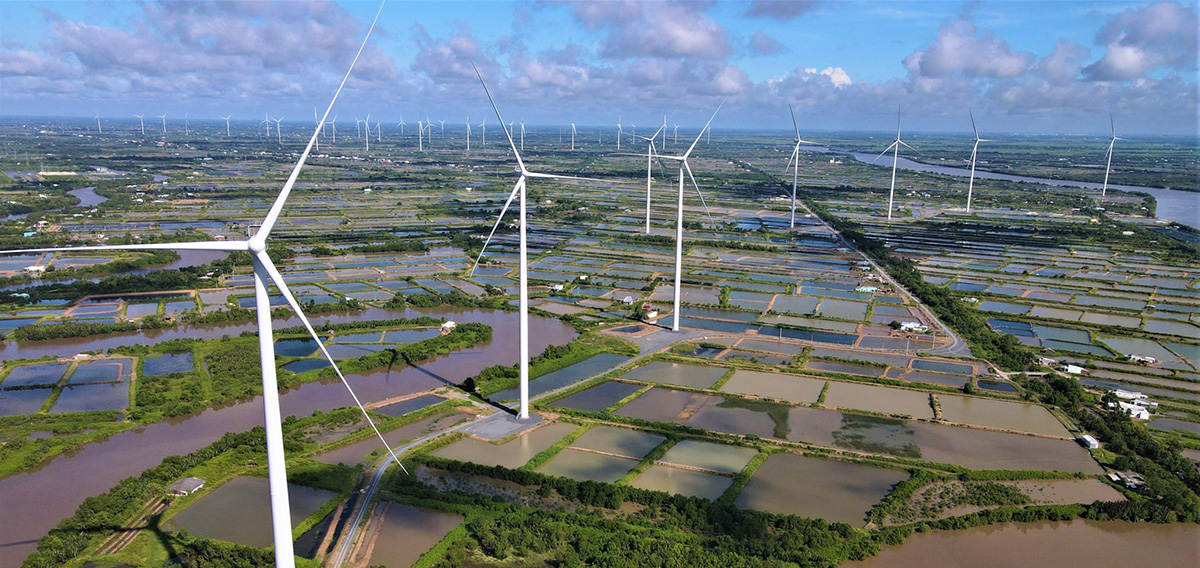The Sustainable Development Report is compiled by SHB using information and data from the actual operations of SHB and its subsidiaries for the fiscal year ending December 31, 2024. Information disclosure is based on Circular 96/2020/TT-BTC.
At SHB, the CEO holds the highest level of responsibility for sustainable development policy. The sustainable development policy is defined in internal documents issued by the Board of Directors and the CEO. The CEO and project teams closely follow the direction and orientation of the Board of Directors, actively implementing initiatives to achieve the goals.
SHB’s sustainable development goal is to focus on comprehensively and systematically integrating international standards, practices and domestic regulations on Environment, Social, and Governance (ESG) into all aspects of banking operations and products. Thereby, building long-term competitiveness, expanding the portfolio of sustainable financial products, and applying a consistent and effective environmental and social management system (ESMS). At the same time, SHB actively contributes to the national sustainable development goals, and enhances value for stakeholders (including shareholders, partners, customers, employees, communities). Accordingly, the specific goals by 2028 are as follows:
Environment (E)
Social (S)
Governance (G)
Environment (E)
- Green credit: Increase the share of green credit to at least 25% of total outstanding loans by 2028, focusing on the fields of renewable energy, organic agriculture, sustainable infrastructure and resource management.
- Internal Emission Reduction: Reduce greenhouse gas emissions in internal operations by at least 30% through the application of energy-saving technologies and promoting digital transformation, using renewable energy, waste and water management, and integrating ESG into procurement.
Social (S)
- ESG training: Ensure 100% of employees understand ESG and sustainable development, with all managers receiving advanced training in ESG risk analysis, international standards and ESG integration in decision-making.
- Social Responsibility: Increase the scale and impact of corporate social responsibility (CSR) and community investment (CSI) programs, prioritizing financial education, culture and sports, and supporting underprivileged communities.
Governance(G)
- ESG Risk Management: Establish a comprehensive Environmental and Social Management System (ESMS) by 2028, in accordance with international frameworks/standards and State Bank guidelines. The system includes identification, assessment, measurement and monitoring of environmental and social risks in credit granting activities.
- Integrating ESG into corporate governance: Develop a roadmap to integrate ESG criteria into overall strategy, credit approval processes, supply chain management, remuneration and performance evaluation of managers.
- Publish annual ESG reports aligned with international standards and SEC guidelines
To develop initiatives and implement policies on environmental and social issues, SHB has officially established the Green Bank Development Project Team under the General Director in 2024. In order to ensure that implementation activities are carried out effectively, synchronously, optimize internal processes and achieve the strategic goals of the project, the ESG Implementation Team under the Green Bank Development Project Team has been established. The project is expected to be implemented in 3 phases:
- Phase 1: Initiation – Setting the foundation: Establishing organizational structure, strategic direction and implementing foundational ESG initiatives.
- Phase 2: Integration and Expansion: Integrate developed products into the common system, scale up and standardize.
- Phase 3: Leading and perfecting: Becoming a leading bank in ESG practices, achieving international recognition.
2. Responsibility to local communities
In 2024, natural disasters caused significant losses, beginning with the devastation of Typhoon Yagi, followed by prolonged rains, flash floods and landslides that severely affected the Northern and Central provinces. The fierce waves of natural disasters made people’s lives extremely difficult. In that context, SHB quickly took action, demonstrating its strong sense of community responsibility, not only helping people overcome short-term damage but also supporting long-term recovery efforts.
That reflects only part of SHB’s broader commitment to building a sustainable society, where everyone has the opportunity to live, study and work in a progressive environment.
In 2024, SHB implements community activities targeting on 4 key areas:
- Education development - nurturing the young generation;
- Sports and culture development - increasing spiritual values for the community;
- Disaster recovery;
- Support the poor
Guided by the principle of “Heart”; SHB’s Board of Directors, headed by Chairman of the Board of Directors Do Quang Hien, together with employees at all levels, have devoted much kindness to continuously carry out activities to accompany the community to build a sustainable Vietnamese society.
In 2024 alone, SHB has spent nearly VND 278 billion on community sponsorship programs, double the 2023 budget, bringing the total contribution to social security activities during 2019 - 2024 to over VND 768 billion.
0
VND Billion
total contribution to social security activities during 2019
3. Environmental impact report
SHB has long determined that sustainable development involves not only secure financial growth indicators but also in the rational exploitation and economical use of natural resources, protecting and improving the environment.
At SHB, environmental policies are specified in regulations issued by the Board of Directors and the General Director. The General Director is responsible for executing the policies. The General Director and the Executive Board have closely followed the direction and orientation of the Board of Directors, actively implementing activities related to social responsibility and environmental protection to bring better values to the community and society.
Environmental impact
Environmental impact
As a financial and banking service provider, SHB’s business operations do not generate large amounts of greenhouse gas emissions or cause significant impacts on the environment. The main sources of greenhouse gas emissions include the use of labor equipment as well as lighting, repair, maintenance of equipment, power generation systems, building air conditioning, and employees and customers transportation. However, at SHB, environmental protection awareness is promoted and spread within SHB, including initiatives to save electricity, reduce plastic waste and enhance digital channels for transactions and meetings to contribute to reducing emissions to the environment...
Raw material
resource management
Raw material
resource management
SHB is a service provider in the financial and banking sector, with primary raw materials consisting of printing paper, printing ink, stationery, etc. SHB’s total annual material costs increase in proportion to the Bank’s operational scale. The Bank is constantly applying measures to save materials while still ensuring work efficiency, maintaining average materials costs as just over VND 2 million/employee/year.
View moreEnergy consumption
Energy consumption
At SHB, the energy consumption primarily includes electricity for lighting, maintaining computer operations, air conditioning, gasoline for staff shuttle vehicles... Accordingly, for both of these criteria, SHB optimizes to reduce gradually each year.
View moreWater consumption
Water consumption
Water is another resource that is carefully managed in the workplace to ensure minimal usage and complied with building’s regulations. The cost of drinking water for staff, employees and guests is covered by SHB under a strong conservation, including practices such as pouring only as much as needed and using glass water bottles in internal meetings. For external meetings and guests, the Bank provides smaller-capacity bottles to avoid waste.
| Item | 2021 | 2022 | 2023 | 2024 |
| Water cost | 1,104 | 1,052 | 1,197 | 1,455 |
| Water cost per worker in 1 year (VND million/person/year) | 0.17 | 0.20 | 0.21 | 0.24 |
Comply with
environmental
protection laws
Comply with environmental protection laws
Compliance with environmental protection laws is a consistent priority for SHB: from external to internal workspace cleaning; from managing wastewater and exhaust gas to saving travel costs, applying digital technology... All SHB employees adhere to 5S principles in all their activities to move towards a GREEN bank - first of all in daily operations, aligning with the goal of sustainable development.
With the awareness of strictly complying with the law on environmental protection, throughout its operation, SHB has not incurred any penalties related to environmental issues.
“SHB must not only grow but must do so sustainably, in alignment with community values and environmental concerns. This is the goal and direction SHB has chosen to contribute to the country’s green and circular economy, in response to the Government’s Renewable Energy Development Strategy to 2030, with a vision to 2050.”
Strongly deploy
the “SHB Go Green”
campaign internally and
in the customer ecosystem
Strongly deploy the “SHB Go Green” campaign internally and in the customer ecosystem
In 2024, ongoing green living competition initiatives were organized to encourage SHB staff and workers to participate in a green lifestyle, save energy and protect the environment, notably the 21 Days Challenge including 6 activities: “Green Suggestions”, “Green Box”, “Green Electricity”, “Saving clean water for a Green life”, “Waste classification for a Green environment”, “Strong Green Team”. The Green Suggestions Challenge alone attracted more than 60 entries from staff in just 1 week of launching, laying the foundation for the success of the subsequent initiatives that will be held consecutively in 2025.
Also, with the message SHB Go Green, SHB won the Aspiration Award in the Green Bank for Green Life contest organized by the State Bank Trade Union. With the efforts of both individuals and groups, each SHB employee serves as a brand ambassador spreading positive values about a bank that is always a pioneer for the sustainable development of the community.
Green financial
market activities
Green financial market activities
Green growth is inevitable, and green finance is a key driver of this transition
Building a strategic framework on green banking
Implementation of green credit project lending
SHB’s next solutions
View more












